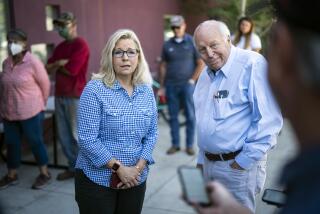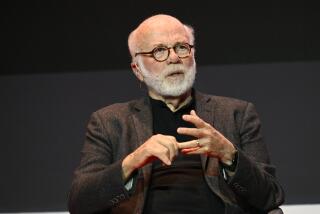100 Hours in March 1991 Shaped Cheney’s Place in History
- Share via
WASHINGTON — Dick Cheney presided over the nation’s armed forces for 46 tumultuous months, but it was 100 hours in March 1991 that sealed his stature in the nation’s collective memory.
For four days, as U.S. troops led the charge that ejected Iraq’s invading army from Kuwait, Cheney stood shoulder to shoulder with Gen. Colin L. Powell, the nation’s senior military commander, and President Bush. The Persian Gulf War brought redemption to the nation’s armed forces, even if, in its wake, Americans believed the victory was far from complete.
For the record:
12:00 a.m. Sept. 3, 2000 For the Record
Los Angeles Times Sunday September 3, 2000 Home Edition Part A Part A Page 4 Foreign Desk 1 inches; 28 words Type of Material: Correction
Gulf War--An Aug. 27 story about Dick Cheney’s tenure as secretary of Defense misstated the month in which the 100-hour ground offensive of the Persian Gulf War occurred. The month was February 1991.
For Cheney, who bathed in the reflected luster of that war’s achievements, it remains a defining moment, one that Republican presidential candidate George W. Bush clearly hopes to evoke when Americans see Cheney standing now by his side as his running mate.
Eye of the Storm
But for those who watched and took part in the Cheney Pentagon, the Persian Gulf War was just one extraordinary moment in a wild four-year ride. The nation’s Cold War adversaries dissolved. World hot spots flared. New missions and old social controversies began to tear at the fabric of a shrinking military.
Cheney--a staff man in cowboy boots--rode the bucking bronco with more precision than flair, and with a steely calm that is one of his strengths. But in the face of epochal change, critics say, Cheney’s reserve made him cautious to a fault.
As Defense secretary from March 1989 to January 1993, Cheney dispatched U.S. troops to hunt down a Panamanian dictator, to house fleeing Haitians and to disarm Somali warlords. When the Berlin Wall crumbled and the Soviet Union disintegrated, Cheney killed weapon systems, rewrote the American military playbook and shrank the U.S. armed forces to their lowest level since the Korean War. He strong-armed lawmakers to shutter military bases for the first time since the end of World War II. And with a combination of stonewalling and political maneuvers, he kept a lid on a caldron of social controversies inside the armed forces--from sexual harassment to women in combat posts to gays in the ranks.
“For most of us, it was an E-ticket ride,” said Sean O’Keefe, who served first as Pentagon comptroller under Cheney and then as Navy secretary. But while the pace of change was breathtaking, Cheney was typically the calm at the eye of a storm. “You could calibrate his emotions with a micrometer,” O’Keefe said. “Nothing seemed to flap him.”
Last week, in a campaign speech before ROTC candidates in Bakersfield, Cheney sought to rekindle the nation’s memories of the Gulf War victory and tie it to his broader experience as Defense secretary. He emphasized how the importance of character “up and down the chain of command, of keeping your word, of honesty and integrity in terms of your conduct in the military, was brought home to me the opening night of Desert Storm.”
Andrew Kohut, director of the Pew Research Center for the People & the Press, believes that while the Persian Gulf War may have cemented an image of Cheney as a leader in Americans’ eyes, his overall record as Defense secretary was important in building the foundation for their respect.
“He’s perceived as having stature,” Kohut said. Recent polls suggest the public wants Washington and foreign policy experience in their leaders, and in Cheney they see both, Kohut said.
While Americans admired his steadiness in the wake of the Persian Gulf War, some saw Cheney as leaden in his response to world changes and timid in managing the military. History has mellowed their judgments somewhat.
Cheney, said MIT political scientist Barry Posen, “could have been a little bolder” in responding to the end of the Cold War. And along with the Bush administration’s other civilians, Cheney should have thought more carefully about the “endgame” of the Persian Gulf War. “You can criticize them on some matters of judgment,” Posen said.
In recent weeks, Cheney has sought to blunt some Republicans’ concerns that he set into motion a free-fall in the defense budget and the nation’s military rolls. While acknowledging his part in beginning the downsizing, Cheney said such cutbacks have “gone too far” under the Clinton-Gore administration.
Indeed, whether he was plotting a controlled descent for the defense budget or firing a general, Cheney insisted on “doing things by the numbers,” O’Keefe said. He devoured briefing books. Before the Persian Gulf War began, Cheney insisted on getting what senior military officers called the “short course on military tactics”: The man who during Vietnam got a deferral from the draft to study political science spent hours boning up on everything from naval minesweeping operations to how an aerial target list was drawn and divvied up.
Cheney took the same methodical approach to drawing down U.S. forces and cutting the defense budget, his lieutenants say. On Capitol Hill, where many lawmakers were quick to demand a “peace dividend,” Cheney was widely criticized for moving too slowly to respond to changes in the world. But politicians who threw out ambitious targets for defense budget cuts irked him; in Cheney’s view, few others had reviewed the broad picture of U.S. military commitments in the detail that he had and carefully toted up the costs of honoring them. Lawmakers’ numbers, he would complain, often seemed to be pulled out of the air.
Under President Bush’s administration, Cheney began a slow drawdown of American might in response to the Cold War’s end, but drew the line at a “base force” of 1.6 million active-duty service personnel. (As of June 2000, there were 1.37 million U.S. men and women at arms.) Last week, Cheney’s penchant for doing things by the numbers was on display in the Bakersfield ROTC speech. If George W. Bush wins in November, Cheney promised, “it would be our expectation to do a thorough scrub of our commitments around the world; decide which ones are really priority.”
One of the Bush administration’s most vocal doubters about the Soviet Union’s demise, Cheney could be almost curmudgeonly in his unwillingness to trust adversaries. But Cheney the former politician had another side, expressed more privately. He was an avid student of the popular forces that propel change among great powers like the Soviet Union, whose leaders he deeply distrusted, according to Paul Wolfowitz, a George W. Bush advisor and Cheney’s top policy advisor at the Pentagon.
In the end, his politician’s instinct convinced him that the people of Eastern Europe and the former USSR would demand lasting changes from their governments.
Such private epiphanies led Cheney to back such initiatives as the sweeping nuclear arms withdrawal of 1991, when the Bush administration took all American bombers and half of the nation’s Minuteman missiles off round-the-clock alert and withdrew thousands of short-range nuclear weapons from U.S. ships and bases in Europe. The move brought about a reciprocal response from then-President Mikhail S. Gorbachev, who ordered the Russian military to decommission more than 10,000 nuclear weapons.
Still, it is the Persian Gulf War that overshadows all else in Cheney’s Pentagon tenure, and that too has brought controversy.
In the war’s immediate wake, polls showed Americans’ esteem for Bush’s administration at historic highs, and the mild-mannered Cheney gained star quality. But within weeks of the allied victory, another picture emerged.
A Tarnished Victory
The Bush administration’s decision to end the ground war and declare victory after 100 hours had permitted large portions of Iraqi President Saddam Hussein’s Republican Guard to escape with their lives and their weapons, and the Iraqi dictator was using his surviving forces to maintain his grip on power.
President Bush and Cheney had repeatedly cited the lessons of Vietnam in vowing to leave the conduct of the war to the generals. But in the war’s aftermath, the generals were less than pleased that the enemy had been allowed to escape with his forces intact.
In time, the officers’ complaints, as well as continued skirmishing with Hussein, tarnished the luster of the U.S. victory. By December 1991, almost 80% of Americans believed America had failed to finish the job in the Persian Gulf, and the Bush administration’s approval ratings sank from a postwar high of more than 80% to around 40%.
A year after the war’s start, Cheney himself expressed wonderment that the Iraqi leader was still in charge and ventured that “Saddam won’t be around very long.” But 10 months later, with Hussein still holding on, it was Cheney and the Bush administration that lost their hold on office.
More to Read
Sign up for Essential California
The most important California stories and recommendations in your inbox every morning.
You may occasionally receive promotional content from the Los Angeles Times.














